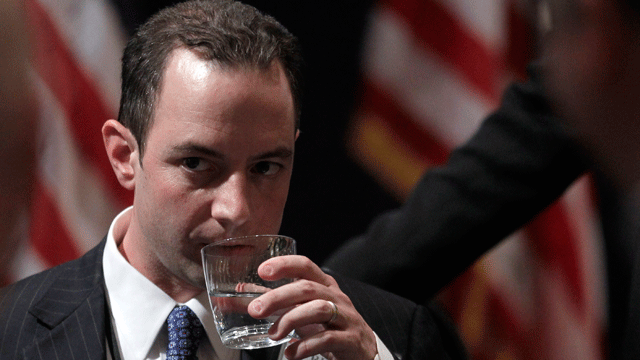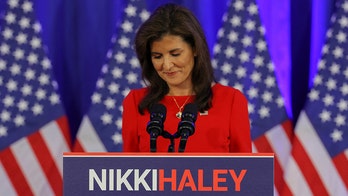
The new elected Republican National Committee (RNC) Chairman Reince Priebus, takes a drink of water, before speaking to members of the media, after winning the post during the Republican National Committee Winter Meeting, Friday, Jan. 14, 2011 in Oxon Hill, Md. (AP)
The new Republican Party chairman's victory lap will likely be cut short by the host of challenges he faces following Michael Steele's contentious tenure.
From the outset, Reince Priebus must dig the party out of a $22 million hole. He must prepare the GOP to take on President Obama. He must unite a GOP in the midst of an identity crisis fueled by the Tea Party.
And, perhaps most of all, he must restore credibility to an RNC whose power has diminished over time, and particularly in the past two years under Steele.
Priebus seems acutely aware of the task at hand.
"We all recognize that there is a steep hill here ahead of us," he said in his victory speech Friday, in which he pledged to start working right away. "And the only way we'll be able to move forward is if we're all together."
Priebus said he will work to restore the faith of the party's donors, develop a new line of communication with state parties and elected Republican leaders and rank-and-file members across the country.
"I understand the challenges that lie ahead of us go well past raising funds," he said. "We must know how to spend the funds effectively to aid in our redistricting efforts, to support our 2011 candidates, to hold a world-class convention, and to be sure that our Republican presidential nominee has the organization in place to beat Barack Obama."
The previous chairman watched from the sidelines as several GOP-leaning outside groups formed to assume campaign functions the party historically has managed, like fundraising, advertising and get-out-the-vote efforts. Major donors and veteran operatives worried about Steele's stewardship stepped in to perform tasks they argued the Republican National Committee wasn't equipped to do under him.
Even so, Priebus insisted that the RNC was "very relevant" shortly after winning the chairmanship. But, as Democrat Bill Clinton can attest after huge losses in the 1994 midterm elections when he was president, any talk of relevancy indicates a problem.
In recent years, changes in campaign finance laws coupled with technological advances have made it relatively easy for deep-pocketed donors to circumvent the national party organizations to have more of a say in national elections by setting up independent groups.
That's what big-name establishment Republicans like Karl Rove and Ed Gillespie did over the past two years as concerns about Steele's management mushroomed amid reports of spending improprieties, anemic fundraising and verbal missteps.
Now, the new chairman is looking to reassert the party's control over national elections, woo back donors who fled the RNC and restore the GOP umbrella organization's tarnished image.
"We're going to bring real leadership back," Priebus, Wisconsin's state chairman, said, acknowledging: "We have a lot of work to do."
Despite all the woes at the RNC under Steele, Republicans still made enormous gains in last November's elections, including winning control of the House of Representatives.
That raises the question: Does it really matter who becomes chairman of a national party?
The 168-member RNC certainly thought so.
Five people, including Priebus and Steele, competed over the past few months for the job.
The favorite heading into Friday's balloting, Priebus led the field through seven rounds of voting.
Steele quit after the fourth when it became clear he could not win another two-year term. Ann Wagner, a former Missouri state GOP chair, abandoned her bid a few rounds later. Maria Cino, a New York native and a veteran party operative who served in President George W. Bush's administration, and Saul Anuzis, a former chairman of the Michigan Republican Party, stayed on the ballot until the end.
Party leaders who worked for Steele's ouster and prospective 2012 Republican presidential candidates quickly rallied behind the new chief.
So did American Crossroads, an outside group that spent millions in the 2010 elections to, in effect, fill in for the beleaguered RNC.
"Over the next two years, no single institution is more crucial in the American center-right movement than a strategically smart and fiscally sound Republican National Committee," said Steven Law, the head of American Crossroads. "While many functions in the political sphere can be managed by independent organizations, the Republican Party remains the backbone of the center-right movement."
Still, he indicated that the group would play "an even more robust" role in the next elections.
In the run-up to the presidential election year, Priebus will serve as the party top spokesman promoting its agenda, countering Democrats, raising money to help Republicans and improving a get-out-the-vote effort that critics say languished under Steele.
A former top lieutenant to Steele, Priebus promised to hire top-notch staff, restructure the organization and put it on solid financial footing so the next GOP presidential nominee will be prepared to take on Obama.
"We have to get on track. And together we can defeat Barack Obama in 2012," Priebus said in a brief victory speech, pleading for unity within the fractured committee. "We all recognize that there's a steep hill here ahead of us, and the only way that we'll be able to move forward is if we're all together."
Topping his agenda, Preibus must retire the huge debt owed to vendors and banks, as well as lure back demoralized donors who have been so frustrated with Steele's management that they sent their dollars elsewhere or didn't open their wallets at all last year. The party had only about $1 million cash on hand at year's end.
Priebus also will have to figure out how to navigate a GOP civil war in which conservatives and Tea Party disciples are trying to pull the Republican Party further to the right to the chagrin of moderates and some longtime establishment leaders.
And he'll have to plan the 2012 GOP convention while helping the GOP navigate the congressional and legislative redistricting process under way following the 2010 census.
The Associated Press contributed to this report.




